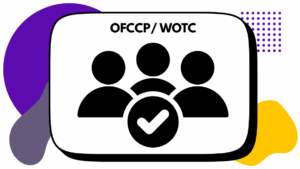The Office of Federal Contract Compliance Programs (OFCCP) and the Work Opportunity Tax Credit (WOTC) are two significant programs that impact employers across the U.S.
Recent proposals to eliminate OFCCP’s dedicated funding and reorganize its functions have created substantial uncertainty, making it crucial for businesses to understand the potential shifts and prepare for them.
Currently, WOTC is not part of the financing bill and was left out of the legislation that passed earlier this year that provided other tax incentives for corporations. Unless WOTC is extended in the next few weeks, WOTC will formally end on December 31, 2025.
 The OFCCP: Reorganization and the Shifting Enforcement Landscape
The OFCCP: Reorganization and the Shifting Enforcement Landscape
The OFCCP is an agency within the U.S. Department of Labor (DOL) that enforces anti-discrimination and affirmative action requirements for federal contractors under several laws, notably Section 503 of the Rehabilitation Act (disability protections) and the Vietnam Era Veterans’ Readjustment Assistance Act (VEVRAA) (veteran protections) [3].1
The DOL’s Fiscal Year 2026 budget proposal included the elimination of discrete funding for the OFCCP and the transfer of its remaining enforcement duties to other agencies [1, 2, 4].2
| Former OFCCP Responsibility | Proposed Transfer Agency |
| Section 503 (Disability) | Equal Employment Opportunity Commission (EEOC) |
| VEVRAA (Veterans) | Veterans’ Employment and Training Service (VETS) |
The enforcement of general non-discrimination and affirmative action protections related to race, color, religion, sex, and national origin (previously under Executive Order 11246) has already been significantly curtailed [4].3
Potential Outcomes for EEOC (Section 503)
The transfer of Section 503 enforcement to the EEOC—the agency that enforces the Americans with Disabilities Act (ADA)—would be a significant change for contractors [1, 2].4
- Shift from Proactive Audits to Complaint-Driven Enforcement:
- OFCCP’s Model: The OFCCP historically used a proactive compliance audit model, systematically selecting contractors for comprehensive reviews of their employment practices and Affirmative Action Plans (AAPs) [3].5
- EEOC’s Model: The EEOC’s primary model is reactive and complaint-driven.6 It investigates specific charges of discrimination filed by individuals [3].
- Potential Impact: Contractors may see a reduction in comprehensive, systemic compliance audits and an increased focus on resolving individual discrimination complaints related to disability accommodations, hiring, and termination. The agency that inherits the role must be granted statutory authority by Congress, which is not guaranteed to be instantaneous [2, 4].7
- Changes to AAP Requirements:
- The DOL has issued proposed rules that would eliminate two key compliance components of the Section 503 AAP: the requirement for contractors to invite applicants/employees to self-identify their disability status (41 CFR § 60-741.42) and the obligation to apply and track progress toward the 7% utilization goal (41 CFR § 60-741.45) [5].8
- Potential Impact: If these proposals are finalized, contractors would be relieved of the burdens of specific data collection and utilization analysis.9 However, the basic Section 503 affirmative action obligation—the requirement to make good-faith efforts to recruit, hire, and advance individuals with disabilities—would still exist and would need to be demonstrated through documented recruitment and outreach [5].10
Potential Outcomes for VETS (VEVRAA)
The move of VEVRAA enforcement to VETS—an agency whose core mission is veteran employment and training—is intended to ensure consistent oversight while shrinking the federal bureaucracy [4].11
- Change in Enforcement Style: Enforcement is expected to shift away from OFCCP’s deep compliance audits toward an approach that likely emphasizes the practical assistance and monitoring roles VETS currently executes.
- Continued Obligations: Regardless of who enforces it, the VEVRAA statute requires federal contractors to prohibit discrimination against protected veterans and take affirmative action, including establishing an annual hiring benchmark and filing the VETS-4212 report [3].12
The WOTC: Incentivizing Hiring and Legislative Uncertainty
The Work Opportunity Tax Credit (WOTC) is a federal income tax credit that rewards employers for hiring individuals from specific target groups (including certain veterans) who face barriers to employment.13 The credit is currently authorized for wages paid to certain individuals who begin work on or before December 31, 2025 [6].14
If WOTC is Eliminated:
- Financial Incentive Disappears: The direct financial justification for specialized WOTC hiring programs would be removed, forcing companies to re-evaluate those budgets.
- Voluntary Commitment: Businesses with a strong Corporate Social Responsibility (CSR) mission will likely continue to prioritize hiring from these groups, recognizing the value of diversity and community engagement beyond the tax benefit.
- Skills-Based Focus: Hiring efforts could become more focused on skills-based recruitment and internal development to ensure a qualified and diverse workforce. Alternatively, some employers may become more homogenous in their employee racial, gender and background makeup.
Preparation is Key
The transition creates an ambiguous period, but two facts are certain: anti-discrimination laws remain in full effect, and proactive compliance is always the best defense.
- Maintain Essential Records: Keep detailed and accurate HR records related to applicant flow, hiring decisions, and compensation to defend against discrimination complaints.
- Adhere to VEVRAA/Section 503 Mandates: Continue full compliance with the current non-discrimination and affirmative action requirements under VEVRAA and Section 503 until a final rule or law officially relieves contractors of those duties.15
- Seek Expert Advice: Engage legal and HR professionals to navigate the regulatory ambiguity and adapt to the enforcement styles of the EEOC and VETS.
References
[1] Hunton Andrews Kurth LLP. Trump Administration Eliminates OFCCP Funding, Reshaping Enforcement Landscape for Federal Contractors.16 (Discusses elimination of OFCCP funding and proposed transfer of functions.)
[2] Hall Benefits Law. DOL Plan to Shutter OFCCP Next Year and Transfer Oversight to Other Agencies. (Cites DOL’s plan to eliminate OFCCP and transfer VEVRAA and Section 503 responsibilities, noting the need for Congressional action.)
[3] U.S. Department of Labor (DOL) and Equal Employment Opportunity Commission (EEOC) general enforcement models and statutory responsibilities under VEVRAA, Section 503, and Title VII.
[4] Ogletree Deakins. Trump Administration Proposes Elimination of OFCCP, Launches New Opinion Letter Program for Labor Guidance.17 (References FY 2026 budget proposal for OFCCP elimination and transfer of functions to EEOC and VETS.)
[5] U.S. Department of Labor (DOL) proposed rules to rescind Section 503 utilization goal and self-identification requirements (Published in the Federal Register, July 2025).18
[6] Internal Revenue Service (IRS) and U.S. Department of Labor (DOL) on the Work Opportunity Tax Credit (WOTC) extension through December 31, 2025.19


